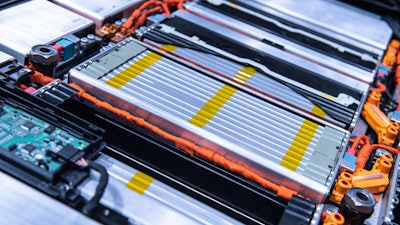
Ricardo has been awarded funding from the Office of Low Emissions Vehicles (OLEV) – through a partnership with Innovate UK –for two projects which aim to improve the efficiency and performance of electric and hybrid vehicles.
One project will investigate the use of innovative advanced thermal management methods to improve the performance and efficiency of the electric motors and power electronics used in electric and hybrid vehicles. The other project aims to improve electric vehicle battery life, performance and resilience.
Improving electric vehicle componentry
Running for 6 months, the project aligns with the UK Government’s aim of reducing greenhouse gas emissions by increasing electrification across a range of transport sectors. The focus of Ricardo’s work in the project, for which grant funding of £190,000 has been provided by OLEV through partnership with Innovate UK, will be the development of an electric motor concept with the aim of achieving a 15-20% improvement in performance compared with that of current state of the art products. If successful, this will provide vehicle manufacturers as early as 2021, with the capability of developing products which are able to meet Automotive Council UK motor and power electronics specific power targets for 2030.
By virtue of its enhanced performance, the concept will enable10-20% motor downsizing and weight reduction, providing improved vehicle packaging opportunities. Crucially, it will also help to bring down the total cost of each vehicle. This will help support the UK Government’s drive to increase the rate of electrification across a range of transport sectors and is applicable to battery electric vehicles, hybrid electric vehicles, plug-in hybrid electric vehicles and fuel cell drivelines. The design principles demonstrated in the new motor can also be applied across aerospace, off-highway and other markets.
Using Ricardo’s Model Based Development advanced thermal and electromagnetic digital design and analysis tools, the company’s engineers will develop the concept and then assess it in a relevant automotive environment, over both legislative and real-world driving cycles. During the project, they will take the opportunity to evolve and update the design and analysis tools so that they can reduce development time of motors and drives by 20-30%. This will provide tangible benefit to vehicle manufacturers: enabling them to bring their products to market sooner and at lower cost.
The final expected outcome from the project is a well-developed concept design with manufacturing considerations which, supported by analysis, will be used to guide global vehicle manufacturers as they develop electric vehicles. This technological advance will enable Ricardo to provide tangible benefit to vehicle manufacturers, enabling them to bring their products to market sooner and at lower cost, which is critical in the highly competitive electrification space.
Ricard Gordon, Ricardo Head of R&D says, “Ricardo’s R&D in novel and disruptive cooling technologies and thermal management is already much in demand with global vehicle manufacturers. We are very appreciative of this latest award of funding which will enable our research to deliver near-term, significant efficiency and performance benefits for global transport manufacturers as they seek innovative technology solutions to accelerate the development and introduction of electric and hybrid vehicles.”
 Ricardo’s Model Based Development advanced thermal and electromagnetic digital design and analysis tools will be used to aid development of new electric motor concepts.©Adam – stock.adobe.com
Ricardo’s Model Based Development advanced thermal and electromagnetic digital design and analysis tools will be used to aid development of new electric motor concepts.©Adam – stock.adobe.com
Digital technologies provide more insights
Within the same funding stream, Ricardo has received funding for an electric vehicle research and development project to digitalize electric and hybrid vehicle development to reduce cost, risk and time to market for manufacturers. In addition, it has also received funding to research methods for improving electric vehicle battery life, performance and resilience.
From its experience in R&D programs on connected vehicle platforms, such as its ConnectHEV technology demonstrator, Ricardo understands the power of digital services to extract insights from large datasets which are generated by connected vehicle fleets. The company’s vision is for advanced monitoring and prognostics services to reduce electric vehicle battery failures in the field and extend battery life.
Running for 6 months, the project has received £112,000 in funding and has three key objectives. The first is the development of a test platform for monitoring and prognostics of battery health, which will form part of a connected battery management system. Secondly, the project aims to investigate novel hybrid physics-based/data-driven prognostics algorithms for battery health management. The third objective is to derive calibration updates for the battery management system from the physics based/data-drive prognostics algorithm; these can then be applied via software-over-the-air.
In order to undertake the research, the Ricardo team will develop tools to virtually represent vehicle fleets; these virtual fleets will provide data for the connected battery management system test platform. The team will address information, data and software flows to and from the battery system, while also focusing on battery monitoring and prognostics algorithm development.
The expectation is that the project will deliver three innovations – key building blocks in the advanced monitoring and prognostics services for electric vehicle batteries which will enable Ricardo to deliver a service to extend battery capacity and range over service life, and therefore reduce cost. First, Ricardo will propose novel data storage methods on a connected battery management system, exploring techniques for data compression without degrading fidelity. Secondly, the team will develop innovative algorithms, combining physics-based modelling and data-driven techniques to generate insight into the battery health. Thirdly, the team will derive from these algorithms techniques to automatically update the battery management system calibrations that will be provided to vehicles over the air.
Gordon says, “For a number of years Ricardo’s R&D has delivered technologies which are helping to accelerate the adoption of electric and hybrid vehicles, so we are delighted that this latest award of funding will enable the continuation of our important research. We are confident that this R&D project will prove to be a significant building block in helping vehicle manufacturers leverage simulation, virtual calibration and trusted data sources to improve electric vehicle battery performance, which will reduce long-term warranty costs and build consumer confidence in great electric or hybrid products. This increased consumer confidence in more environmentally friendly alternatives to conventionally powered vehicles will make a difference in reducing greenhouse gas emissions.”




















